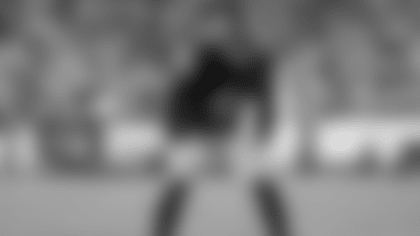Q. You have often talked about DeShon Elliott's value to the defense for his playmaking and as a communicator, and now he's out today with a hyperextended knee. Who is the next man up there?
A. It'll be a collection of people, to be quite honest with you. We've acquired some safeties during the course of this journey, since this train left the station. Chuck Clark, we picked up about a few days into training camp back in Latrobe. Jabrill Peppers is another guy we picked up along the way, I think right before Week 3. We were able to acquire Kyle Dugger this week. And so we've got a collection of guys who are not new to the National Football League, and that helps the process, but certainly it's a challenge being new to Pittsburgh, our language, working with our guys, and so we've just been working diligently this week. Their experience helps them, but certainly we're urgent about this process, and in getting that collective ready. When you lose somebody like DeShon, it's never a one person job. Usually it's a multi-person job. We also have some personnel flexibility in terms of the defensive packages that we can put on the field. We can put an additional linebacker on the field in the form of a big nickel, if you will. You know, that's Payton Wilson. And so we got a bunch of irons in the fire because it is required. We'll get a sense as it unfolds, who's communicating the best, performing with the greatest fluidity, and their talents are showing up. And as you know, as the process wears on, I'm sure we'll gain clarity there.
Q. Does that next man up also have to assume the communications duties?
A. No. We moved Jalen Ramsey exclusively to safety this week, to offset. Jalen has played outside corner, he's played nickel corner, he's played safety. Given the circumstances, we felt it was prudent to lock him down specifically at free safety, and so he'll be a constant hub of communication to assist all of those potential candidates who I mentioned in processing and playing.
Q. When Chuck Noll was displeased with the performance of his offense, he often would say it was time to get "back to basics," which meant to simplify and stress fundamentals. Can that approach work with defense, or is "simple" too easy for NFL offenses to exploit?
A. I think when you're not getting what you desire, you take the opposing offense equation out of it, and you talk about yourselves. And how do we best fluently communicate? How do our talents best show? How do we play fast and with emotion? And so certainly I am in a Chuck Noll mindset regarding where we are defensively. We need to reduce because the amount of errors on our tape tells us to. We need to reduce, because the number of missed tackles and so forth tells us to. Oftentimes, people think missed tackles are talent related, and they certainly can be. But sometimes it's just a lack of cohesion, lack of how you fit in the big picture, altering your angles, getting you out of position, and thus creating the missed tackles. And so I am certainly in the Chuck Noll lane in terms of our approach to how we're going about our business this week. It is appropriate. Opposing offenses have nothing to do with it. You got to look in the mirror when you're not getting what you want, and make decisions based on that.
Q. You constantly stress the importance of ball-seeking, and the technique to create those kind of takeaways is taught and practiced. In watching game video, have you seen ball-seeking interfere with getting the guy on the ground, and are you willing to take that chance if it does?
A. it's certainly a risk to manage, and I am willing to risk it, because the ball is the game. But I don't think it has been a negative impact on our tackling. I'm not going to hide behind that. We've just got to tackle better. We search the ball appropriately. We drill it. When you're in a chase you ball search. When you're the first hitter, you don't. When you're the second hitter, you certainly do, etc. We have a lot of guidelines to go by in terms of that, and none of it, in our opinion, compromises the tackle component of it. When our tackling is subpar it is because our tackling is subpar, certainly not because we're ball searching.
Q. The extra offensive lineman formation has been successful, with Spencer Anderson handling that role. What are you looking for in terms of a skill-set for that extra offensive lineman role?
A. Football intellect. You've got to be a smart guy. A couple of guys in recent years who have had success with us in that space – Zach Banner a number of years ago and now Spencer Anderson – they've got to be sharp guys. And interestingly enough, guys who played skill positions at a younger age, and they see the game from a totality perspective. You know, when you're a tight end, reporting is eligible, you have to shift in motion. And a guy that's played in the offensive line his entire life, that is a foreign concept. Spencer Anderson, for example, was a tight end as a teenager, and he just outgrew it. He was an AAU basketball player. Zach Banner was a big AAU basketball player. Those are usually the type of athletes that who are comfortable with some of the things that go with becoming an eligible when you've been an ineligible. Guys who have been offensive lineman all their lives, going in motion and some of that stuff is a real foreign act to them.
Q. In the weekly team rankings that the NFL makes available to the media, the Indianapolis offense is ranked no lower than 7th in 16 of the 17 categories listed. Do you have to enter the game with the idea that it's going to take at least 30 points to win?
A. I don't. No disrespect to their body of work and what they've done, but this is the National Football League. Every weekend you've got to prove it. You begin anew every weekend. That applies to us, that applies to those we compete against. I'm not going to anoint them. They've got to earn that in-stadium. We all have to earn that in-stadium each and every week. And I just think that's the mindset held by all parties involved that compete on the stage
Q. During your Tuesday news conference, you said that Colts RB Jonathan Taylor is on top of his game. What is his game?
A. Man, he's got it all. He's playing like Saquon Barkley was playing last year, to be quite honest with you. He has all those physical talents. He's got great stop-and-start ability, he's got lateral burst, he's got top-end speed, he's got contact balance, he plays behind his pads. He is just a guy who's really on top of his game right now, and it's reflective in his highlights and their highlights. And they're riding that pony. A guy who's capable of going 80 yards for a touchdown like he did last week on this stage, but he's also giving you the tough yards in those situational moments. He is built for the job, and it's going well for him right now.
Q. Colts QB Daniel Jones currently is the second-rated quarterback in the AFC, but he's also a guy who was cut by the New York Giants, spent time on the Minnesota Vikings practice squad, opted for free agency, and then signed with Indianapolis. In the 2019 NFL Draft, he was the 6th overall pick. What skills did he have that made him such a high draft pick, and is that what we're seeing now?
A. He certainly has all the physical talent. He's big, he's athletic. He's got great straight-line speed. He can make all the physical throws on the field. And so there's a lot of layers to that discussion. Sometimes performance is environmental, it is outside of you, those that you work with, the structure in which you work, the schematics, etc. And so there's a lot of things that could have produced his journey in New York, but certainly you're seeing some of the things now that made him the sixth overall pick in the draft. I think that's kind of reflective of a lot of things that happen in today's game. The top quarterbacks, because of the parity and how our system is constructed, oftentimes go to the worst environments, or the "sickest environments." And so good players get drafted by bad teams and oftentimes that affects them as individuals. There are just a lot of examples of that in recent years, and I just think he is the latest. Baker Mayfield could be one of those examples. Sam Darnold could be one of those examples. I think Geno Smith, with the totality of his career and some of the things he's been able to do later in his career, is an example of that. The start doesn't always determine the journey. A component of people's growth and development is environmental and is outside of their control and outside of them. That's a tough thing to swallow at times, but it is a major component of cooperative work, and I view football as the ultimate team game where cooperative work is a major component of it. Our destiny is determined not only by us, but by those we work with. And that's why it's such a fragile thing. That's why teamwork, and the team component of this game is so significant. Because, man, we're interdependent, more so than any other sport, more so than any of the other major sports. You've got nine guys on a baseball diamond; you got five on a basketball court. That 11-man fluid, competitive work that's involved in our game, 22 on both sides of the ball, there's an interdependency there. People's livelihood rely on our ability to function as coaches and as players, individually and collectively. And so there's a seriousness to it. And some of those quarterbacks who have been highly regarded in the draft who go on to have bigger careers when they change environments are kind of examples of how interdependent success is in our game.
Q. Lou Anarumo is in his first season as the Colts defensive coordinator, but before that he spent 2019-2024 as the Bengals defensive coordinator. What have you seen from watching video of the Colts this season that's reminds you of what you saw from the Bengals during his 6 seasons there?
A. Every single bit of it. Schematically you can draw parallels. Kenny Moore is Mike Hilton, for example. Zaire Franklin is Logan Wilson. Schematically, the parallels are unbelievable. But again, Lou has a mode of operation, and most successful long tenure coordinators do. They might change locations, but what they do is what they do. Steve Spagnuolo in Kansas City is doing similar things that he did in New York, for example. It's just this game. Lou is very credible and very good at what he does. Certainly, things didn't go as well as he and they would have liked at the end of his tenure in Cincinnati, but it doesn't change the fact that he's capable and credible. And you're seeing that in Indianapolis.
Q. In talking about Colts Coach Shane Steicken, you said he has good run game balance. What is run game balance?
A. Meaning that his run game is fundamental, is technically sound, and is backed up by corresponding play-action and misdirection passes. And you've got real good balance when your run game is solid and you have corresponding play-action and misdirection passes that manage the non-possession downs in our game. Third down, red zone, short yardage, all that stuff is different, but when you have that good running game and the corresponding misdirection and play-action passes that manages a lot of first and second downs, it minimizes potential negativity. It keeps you on schedule, minimizes the potential turnovers, and that's why they're ranked as high as their ranking in some of the categories you mentioned a little bit earlier.
Q. The trade deadline is Tuesday, Nov. 4. How do you handle the time between now and that deadline in terms of procedure with respect to either buying or selling right up to that deadline?
A. That's the standard operating procedure for us. I think everybody is a potential buyer, everybody is a potential seller. Front offices around the league understand that this time of year, and particularly at the 11th hour there's a Black Friday type frenzy. Some people are looking, some people are not. It's something that we all partake in. It doesn't get in the way of the day-to-day or the things that you need to do to prepare for the next game. But if you happen to get better in some way, whatever your perception of better is. It might be draft capital things that you value. It might be players who can help you on this journey. Everyone engages in it. And it's not a distraction. It's part of the process.













